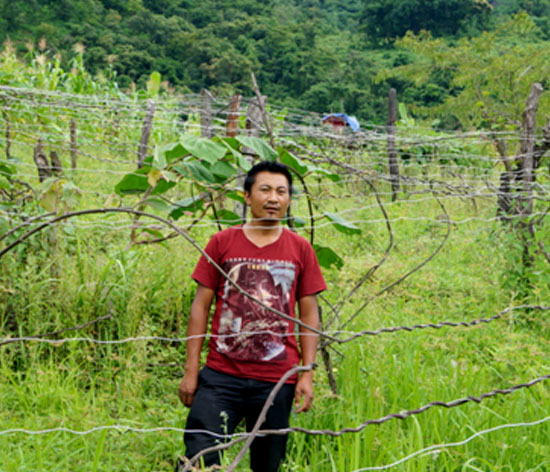
Z Thotreichan, a resident of Razai Khullen village, Chingai block, Ukhrul district of Manipur used to work in a Microfinance Institute in Ukhrul. Married and a father of 4, he often expressed concern for the economic stability of his family. He realised that, with the job he had, it would be very difficult to send his children to a good college.
Thotreichan’s family had a farm back home. While working, he had once visited his boss’s farm and thought to himself that maybe this was something that he could pursue to achieve economic stability. After his father’s death in 2015, he decided to quit his job and return to their farm. He also sold his other plot of land for Rs5 lakh and started to develop 1.89 hectares of land under integrated farming.
There were many challenges in the beginning. Labour was required, as his brother and he couldn’t do all the work alone. Water in the farm wasn’t sufficient, limiting the vegetation to the Kharif season, allowing him to do short-term cropping only once a year. Thotreichan soon realised that he needed proper training to get the best from his family land.
Around this time, he learned about the Tata Trusts’ programme on diversion-based irrigation, and attended the permaculture training in his village, organised by the Trusts. He also attended other trainings supported by another development organisation. Tata Trusts later helped him with irrigation support of 900 metres of 25mm poly-pipe, provided him with orange and kiwi saplings to grow, and barbed wire for fencing.
To gain more technical know-how, Thotreichan also attended a fishery and gardening training organised by a Krishi Vikas Kendra in Ukhrul. He then intercropped the farm with fruit trees and short-term crops like maize, beans, chilli, sesame, coriander, celery, spring onion and cabbage. He planted 60 orange, 100 kiwi, 80 avocado, 200 perkia , 80 banana and 10 jackfruit trees - and 20 gooseberry trees grew naturally. His training also helped him to develop 6 fishery ponds, a poultry unit and a piggery around the farm that was well fenced with barbed wire to prevent domestic and wild animal menace.
Thotreichan could only earn Rs40,000 in 2016, but in 2017, he got an additional benefit of Rs10,000 with the first intervention by the Trusts. Until December 2018, he had earned Rs1,48,500 from his farm. Thotreichan believes that all the training he received certainly contributed to his success, but his will to keep trying also boosted the output.
Thotreichan explains, “When I quit my job and returned to my family farm, the villagers said I shouldn’t waste my time; farming was for uneducated people. But today, I am an inspiration for many of them, as they plan to follow in my footsteps.”
